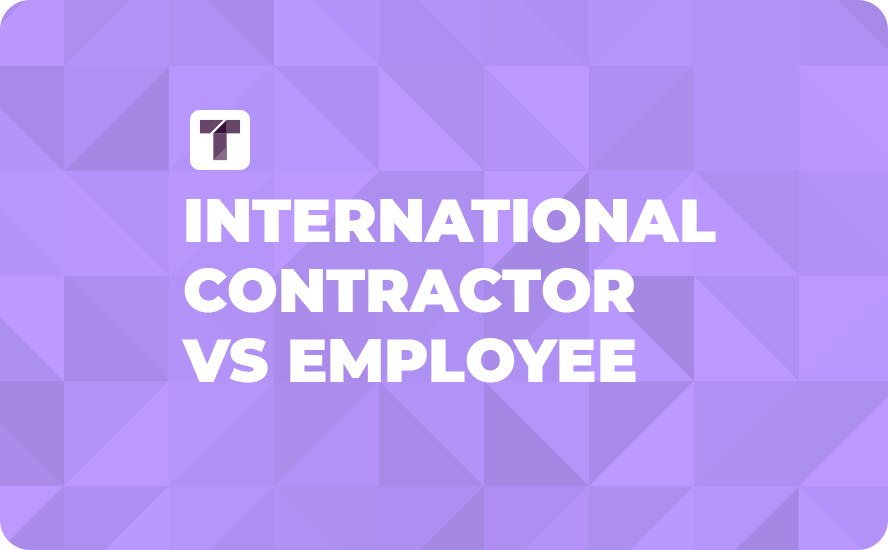More and more companies have updated their business model to include remote workforces – and tech companies may benefit more than most. If your U.S.-based tech company has started to move towards a remote workforce and plans to add global employees, you may have questions about the best way to add employees to your team. TRUSS may be able to help.
When you employ a remote team and global employees in emerging markets like Central Asia, you have two primary employment options. Independent contractors and employees. You may be asking – what are the differences? We have created a quick International Contractor vs Employee comparison at TRUSS to help you find the right fit for your global workforce.
Contact TRUSS today to learn more about our services that will help you build a global and remote workforce!
READ MORE: Best Ways to Hire Global Remote Talent
What Are the Differences Between International Contractors and Employees?
Tech companies that hope to hire abroad in Central Asia have a pair of employment options – international employees and international contractors. When you decide to expand your remote workforce to include software developers, engineers, IT specialists, and more in foreign countries, it is vital to understand the key differences between international contractors and employees – and the pros and cons of each option for your company.


What Are International Contractors?
The key difference between an international contractor and an employee is that a contractor is self-employed as an individual or a Limited Liability Corporation (LLC) in many cases. Independent and international contractors are hired to take on specific projects and augment the company team and in essence decide when, where, and how the work is completed – as long as it is completed by any contracted deadlines.
What Are International Employees?
Employees – as you might imagine – work directly for a company. This means that employees are entitled to specific employment rights and the employer is obligated to meet certain expectations in support of their employees. The company establishes the when, where, and how projects and work are to be completed – compared to independent contractors.
Pros and Cons of International Contractors
When your company hires international contractors, it is important that you understand the pros and cons as a company. Here is a better look at how hiring an international contractor will impact your bottom line as a company.
- Pro – Supplement your team with contractors ready to work.
- Pro – May be a resource for additional skilled employees and contractors.
- Pro – Self sufficient with less need for onboarding or training.
- Pro – No need to supply office space or equipment.
- Pro – Contractors work independently.
- Pro – Your company only pays for the work needed.
- Con – Contractors may work with multiple clients and have divided attention.
- Con – You have limited control over how tasks and projects are completed.
- Con – Contractors can be easily misclassified with updated statuses.
- Con – May be more difficult to deal with local laws and taxes.
- Con – Employment contracts must be localized to specific countries.
- Con – You need to find an employer of record to convert contractors to employees.
- Con – Intellectual Property may not be as well protected with contractors.
- Con – May be difficult to manage more international contractors.
- Con – You may lose contractors as projects come and go.
Pros and Cons of International Employees
Are you hoping to build a global team for your tech company? TRUSS can help you find, recruit, hire, and manage international employees from Central Asia – eliminating a few of the challenges that you may face. Here is a better look at the pros and cons of hiring international employees with TRUSS.
- Pro – Hire the best talent available in select regions.
- Pro – Your company sees the benefits of investments made in training.
- Pro – Eliminates risk of misclassification.
- Pro – New perspectives and skills create innovation.
- Pro – More control over Intellectual Property.
- Pro – International assignments available.
- Con – May be difficult to create a consistent company culture.
- Con – Office equipment and employee amenities need to be supplied.
- Con – Employees may need additional training and development.
- Con – Need for local HR, legal, and tax expertise. – Help available with TRUSS
- Con – Employment must be compliant with local labor laws. – Help available with TRUSS
READ MORE: Best Regions to Build Your Global Remote Team
Why Choose TRUSS to Help Hire International Employees?
Tech companies that hope to hire developers, engineers, and IT specialists in Central Asia will find that international employees are the right choice in this International Contractor vs Employee comparison created by TRUSS. The pros of international employees are too many to ignore and the potential cons – like tax issues and employer of record services – can be mitigated with the help of TRUSS.
TRUSS provides a global employment platform with an international team in Central Asian countries like Uzbekistan, Kazakhstan, and Georgia, that will help you find, recruit, hire, and manage international employees. TRUSS can function as your employer of record and will help you remain compliant with local labor and tax laws.
Contact TRUSS today to learn more about how we can help you find global talent for your team!

